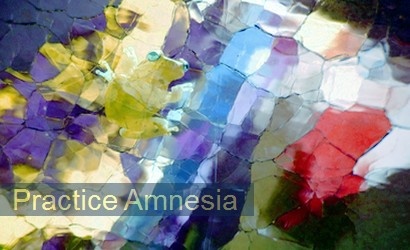A Forgotten Treasure
08/01/15

The whole week my friend Y had done his practices to be aware of his body, mind and soul, so he told me. For him this meant daily meditation, biking 2x a week and doing regular memory exercises.
Then,on Tuesday morning, he had to attend a meeting at which he had to give a presentation about a new product. While he felt well prepared, an increasing anxiety was creeping in when he entered center stage. In the moment when he began talking he actually perceived a complete blank. He had memorized most of his text and had thought to make an impression by communicating freely with his audience. Instead he read his notes rarely even lifting his head. All his practices apparently had been lost. Practice amnesia had gotten the better of him.
He managed to get through the ordeal and was even rewarded some polite applause when returning to his seat. Very slowly the dense fog that had befallen his brain and a feeling of slight depression and doubt crept in: why did his preparations not prevent the anxiety? Was he cultivating the right practices? Did they have any effect at all if they couldn't prepare and protect him in situations of stress?
Suddenly he felt the physical strain inside his body, more specifically in his shoulders and his neck.
Anger was setting in, yet just then he remembered: let it go! Suddenly he felt the physical strain inside his body, more specifically in his shoulders and his neck. When he relaxed the shoulders he perceived a sting in his chest . . . and suddenly he knew it had started there: he took some deeply relaxing breaths and consciously released the tension in his chest, shoulders, neck and . . . head! Always downwards, just dropping it bit by bit. He thought the bit thing to be ironic since indeed he had been using the 'wrong' information anyway. Or had he?
Why was it so difficult to stick to the uplifting experiences of his cultivation practices? Or was this precisely what had to happen? He tried to remember what actually did happen in the run-up to the event . . . and slowly memories began trickling in.
Y remembered that he had been a bit late when leaving the house. Although he felt confident and eager at that time, he assumed that he couldn't make up for the time and that traffic and everything else had turned against him. When he finally arrived, he was still in time but had build up lots of tension in his body and his concentration had been shattered by his negative self-talk. Instead of anticipating something good he was in crisis. He hardly recognized friends and colleagues greeting him.
Such was the situation when he entered the stage.
Worry Is A Thin Stream Of Fear Trickling Through The Mind. If Encouraged, It Cuts A Channel Into Which All Other Thoughts Are Drained.
Y was thinking about how he could avoid similar stressful mishaps in the future. He decided that he needed to focus on ONE basic technique that he could use even in confusing situations. When he ran his internal practice archive he finally decided on a choice between two: a breathing exercise and 'Grounding'. He recalled the relaxing effects of long out-breaths, but then he felt that 'Grounding' was the most basic and effective exercise he needed.
Y searched through a stack of papers and eventually found what he was looking for: descriptions and comments on various cultivation practices. One said simply 'Grounding'. It read like this:
1. feel gravity where it hits you:
- standing/walking (feet)
- sitting (bum)
- lying down (back)
2. relax exactly into the resistance you feel
3. imagine/feel a 'falling into the ground'
Y read some comments he had jotted down after his first experiences with it. 'apparently works always since gravity is present at any time. staying with it in social situations is as difficult as with any other practice. energy booster if internalized'.
Y decided to apply his own medicine right in this moment.

Comments
You must be logged in to post comments in the magazine.
There are no comments in this article yet.